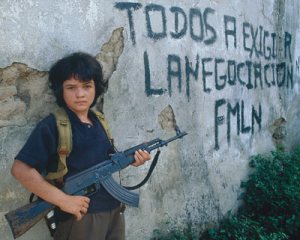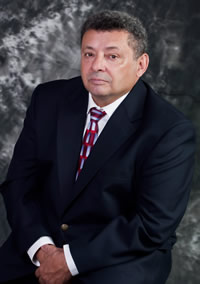 Born in El Salvador, Ana Martinez was raised in a comfortable environment. Although she did not know her father, her mother’s family members held respectable positions in the Salvadorian government. Her grandfather had been a colonel in the military. A former Ms. Universe contestant, pianist, and opera singer, her mother worked for the Ministry of Education, raising Ana and her two brothers as a single parent. However, a civil war erupted. This tore the country apart and placed her family in jeopardy.
Born in El Salvador, Ana Martinez was raised in a comfortable environment. Although she did not know her father, her mother’s family members held respectable positions in the Salvadorian government. Her grandfather had been a colonel in the military. A former Ms. Universe contestant, pianist, and opera singer, her mother worked for the Ministry of Education, raising Ana and her two brothers as a single parent. However, a civil war erupted. This tore the country apart and placed her family in jeopardy.
THE DISRUPTION OF CIVIL WAR
Shortly after Ana’s two older brothers, one majoring in engineering and the other in arts, enrolled in college, they began participating in student protest activities. Within a few months, the civil war escalated. Ana’s brothers were approached by guerrilla leaders. They feared retaliation if they did not join the movement to overthrow the government.
To protect her sons, Ana’s mother sold the family home and used the money to send them to live with relatives in the United States. Within the next year, the conditions in El Salvador worsened. The civil war grew more violent. Murders and massacres spread. Ana’s mother knew she and Ana might become a target for the guerrillas. Painfully, she decided they had to move.
On the morning of Ana’s ninth birthday, Ana and her mother left to join her brothers. Her entire wardrobe consisted of three dresses. Like her mother, Ana couldn’t speak, read, or write English.
The journey to America did nothing to reassure her. She and her mother traveled through El Salvador, Guatemala, and Mexico – by bus, car, train, and foot. They went without food and comfortable sleep for long hours. People they met along the way were often rude and mean-spirited. After several weeks, they reached the Rio Grande. They entered the United States in mid-September of 1981 and relocated in Los Angeles, California.
AN UNFRIENDLY WELCOME
 Ana was miserable and upset after the move. She had not wanted to leave her country. In El Salvador, she had left a nice home, close friends, and nine-year old fun. She did not like her new school and could not communicate in English. She and her mother rented a small room as sub-tenants in the Korea Town area. Her mother, once a respected government employee,found work as a housekeeper, earning less than minimum wage.
Ana was miserable and upset after the move. She had not wanted to leave her country. In El Salvador, she had left a nice home, close friends, and nine-year old fun. She did not like her new school and could not communicate in English. She and her mother rented a small room as sub-tenants in the Korea Town area. Her mother, once a respected government employee,found work as a housekeeper, earning less than minimum wage.
Her brothers, having been in the U.S. a year longer, took on the burden of providing for their mother and little sister. High achieving college students at home, one brother went to work as a janitor and the other took a job in a textile factory while they went to school at night to learn English. Together they earned enough to pay for a studio apartment so the four of them could live together again.
Ana was transferred to a school in Santa Monica, which, in the early 1980s, was not a culturally diverse area. Her classmates at Westwood Elementary School were not hospitable. They called her a “wetback” and other names. Although she was from El Salvador, they taunted her, “Go back to Mexico. We don’t want you here.”
A LITTLE HELP GOES A LONG WAY
Soon afterwards, Ana and her family caught some lucky breaks.
First, Ana found a new friend, a girl from Puerto Rico who spoke both Spanish and English. With her friend’s help, Ana began learning English. By the sixth grade, Ana was a “C” student.
Second, a new immigration program called legalization was approved by the Reagan Administration. This law enabled Ana’s family to become lawful permanent residents and, over time, naturalized U.S. citizens. Having mastered English, her older brothers resumed their college studies and became successful professionals. One graduated with a degree in computer technology; he continues to work in this field today. The other is currently the Chief Executive Officer for an Assisted Living facility in Studio City.
Ana, too, pursued higher education. She graduated from Pomona High School in 1990. She was accepted to San Diego State University but the pace was too fast for her. She left SDSU and re-enrolled at San Bernardino Valley Junior College. After earning an Associate Degree of Science in 1996, she promptly passed the State Certification exam and became a Registered Nurse.
In 1999 she resumed her studies, enrolling at Holy Names University in Oakland, California. She graduated in 2001 with a B.S. degree in Nursing. She worked a few years at the Loma Linda Medical Center. Later she took a position at Kaiser Permanente, where she currently works in the Neonatal Intensive Care Unit.
Having met at SDSU, Ana married Jose Martinez in 1994. Jose, presently a graduate student at California Baptist University, works as a substitute teacher in the San Jacinto Unified School District and as a private tutor. They have three daughters, ages 6, 8, and 13.
LOOKING FORWARD, LOOKING BACK
 Besides working full-time, Ana volunteers 20-30 per week. She serves as the PTO President at her oldest daughter’s middle school and PTA historian at her younger children’s elementary school. She also helps out in her six-year old’s kindergarten class on a weekly basis. In addition, she is a member of the School District’s ELAC Committee and Advisory Council.
Besides working full-time, Ana volunteers 20-30 per week. She serves as the PTO President at her oldest daughter’s middle school and PTA historian at her younger children’s elementary school. She also helps out in her six-year old’s kindergarten class on a weekly basis. In addition, she is a member of the School District’s ELAC Committee and Advisory Council.
Ana works closely with Hispanic parents, many of them first generation immigrants like herself. She understands the move here can be overwhelming. In particular, she feels a special mission to work with students who struggle in school, just as she did many years ago.
“Too many young Hispanics,” she notes, “do not see school as important. They just want to get through school, and view college as a waste of time. They don’t want to learn English and just want to go to work, even if it is a low wage position.”
Ana no longer misses El Salvador. Her memories are blurred. She does not follow news about her homeland – except for a brief period when Armando Calderon,  her mother’s cousin, was President from 1994 to 1999. She does not have any Salvadorian friends, nor has she been in contact with any relatives who remained behind. She still enjoys eating her native food but only knows two restaurants which serve Salvadorian food. Ana wants to go back someday for “closure” and to show her children where she and her family lived.
her mother’s cousin, was President from 1994 to 1999. She does not have any Salvadorian friends, nor has she been in contact with any relatives who remained behind. She still enjoys eating her native food but only knows two restaurants which serve Salvadorian food. Ana wants to go back someday for “closure” and to show her children where she and her family lived.
Despite earning a college degree and working as a professional for over a decade, Ana still experiences discrimination. When she enters a hospital room, patients sometimes ask her, “Are you here to take out the trash?”
Co-workers ask her why other immigrants aren’t like her. She hears their complaints, “They’re a bunch of free-loaders living on welfare with too many kids.” She knows this is an unfair criticism made by people who do not truly understand the immigrant’s journey to America.
Normally, Ana doesn’t waste time responding. In her view, people will always have biases and prejudices. Hostility towards immigrants, she feels, has increased over the past ten years.
Instead, she focuses on her good fortune. “In America, you can make a difference. You can live a better life. With a little sacrifice and hard work, you can achieve almost anything.”




 Born in El Salvador, Ana Martinez was raised in a comfortable environment. Although she did not know her father, her mother’s family members held respectable positions in the Salvadorian government. Her grandfather had been a colonel in the military. A former Ms. Universe contestant, pianist, and opera singer, her mother worked for the Ministry of Education, raising Ana and her two brothers as a single parent. However, a civil war erupted. This tore the country apart and placed her family in jeopardy.
Born in El Salvador, Ana Martinez was raised in a comfortable environment. Although she did not know her father, her mother’s family members held respectable positions in the Salvadorian government. Her grandfather had been a colonel in the military. A former Ms. Universe contestant, pianist, and opera singer, her mother worked for the Ministry of Education, raising Ana and her two brothers as a single parent. However, a civil war erupted. This tore the country apart and placed her family in jeopardy. Ana was miserable and upset after the move. She had not wanted to leave her country. In El Salvador, she had left a nice home, close friends, and nine-year old fun. She did not like her new school and could not communicate in English. She and her mother rented a small room as sub-tenants in the Korea Town area. Her mother, once a respected government employee,found work as a housekeeper, earning less than minimum wage.
Ana was miserable and upset after the move. She had not wanted to leave her country. In El Salvador, she had left a nice home, close friends, and nine-year old fun. She did not like her new school and could not communicate in English. She and her mother rented a small room as sub-tenants in the Korea Town area. Her mother, once a respected government employee,found work as a housekeeper, earning less than minimum wage. Besides working full-time, Ana volunteers 20-30 per week. She serves as the PTO President at her oldest daughter’s middle school and PTA historian at her younger children’s elementary school. She also helps out in her six-year old’s kindergarten class on a weekly basis. In addition, she is a member of the School District’s ELAC Committee and Advisory Council.
Besides working full-time, Ana volunteers 20-30 per week. She serves as the PTO President at her oldest daughter’s middle school and PTA historian at her younger children’s elementary school. She also helps out in her six-year old’s kindergarten class on a weekly basis. In addition, she is a member of the School District’s ELAC Committee and Advisory Council. her mother’s cousin, was President from 1994 to 1999. She does not have any Salvadorian friends, nor has she been in contact with any relatives who remained behind. She still enjoys eating her native food but only knows two restaurants which serve Salvadorian food. Ana wants to go back someday for “closure” and to show her children where she and her family lived.
her mother’s cousin, was President from 1994 to 1999. She does not have any Salvadorian friends, nor has she been in contact with any relatives who remained behind. She still enjoys eating her native food but only knows two restaurants which serve Salvadorian food. Ana wants to go back someday for “closure” and to show her children where she and her family lived. March 23, 2009, Riverside, CA – Carlos Batara’s new website
March 23, 2009, Riverside, CA – Carlos Batara’s new website